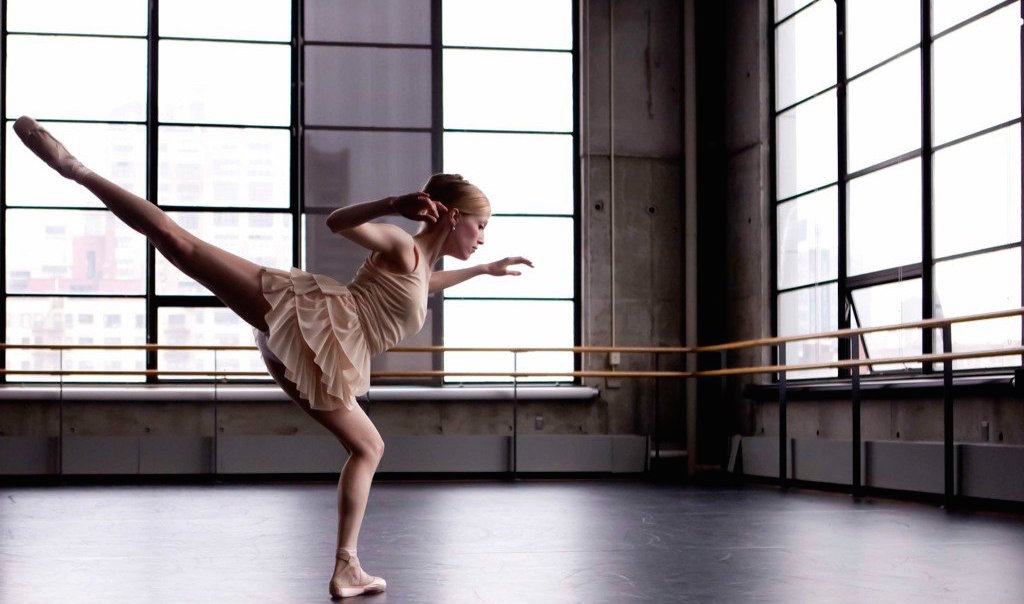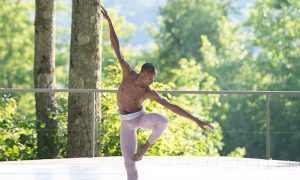For many teenage dance students, especially those who want to become professionals, there is a big life decision ahead: What do I do after high school? Do I try to immediately pursue a professional career? Or do I take the next four years or so to attend college, perhaps to study dance?
The choice, of course, will be individual, and may also depend on where you’d like to take your dance career. To aid in this decision, Dance Informa speaks with four professional dancers who studied dance in college and have had rich careers since then. Their paths and experiences differed, but each can offer insight to those dancers who are a little unsure – “Is college dance for me?”
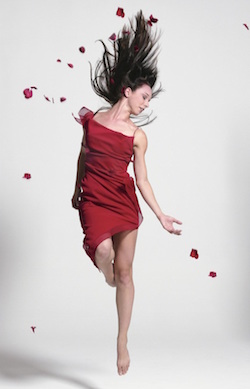
Tawny Chapman received a BFA in Dance Performance from Chapman University. Photo by Tim Agler.
The Dancers
During high school, Ian Spring, now a dancer with Parsons Dance, did not see himself attending college for dance. In fact, he auditioned for Point Park University “on a whim”, he says. But a few years later, Spring found himself with a BA in Dance, with a concentration in jazz, and it was that college experience that directly led him to Parsons.
The decision for dancer and teacher Tawny Chapman, on the other hand, was very clear. The dancer, who is now a company member with Backhausdance in California, followed in the footsteps of her childhood mentor and attended Chapman University, where she earned a BFA in Dance Performance. Chapman now dances, serves as her company’s resident graphic designer, social media manager and summer intensive coordinator, and she instructs at the Orange County School of the Arts.
Lauren Fadeley, now a principal dancer with Pennsylvania Ballet, took a slightly different route. After joining New York City Ballet (NYCB) at just 16 years old (and enduring a broken foot her second year there), Fadeley realized she didn’t want to dance professionally. After four years of studying dance at Indiana University (IU), however, she found her way back to the stage.
And Donna Salgado, a freelance contemporary ballet dancer, choreographer and founder of CONTINUUM Contemporary/Ballet, received back-to-back higher education degrees after high school, as she valued both education and saw a major in dance as a great opportunity. She holds a BFA in Dance Performance from Towson University and a MFA in Dance Performance and Teaching from Purchase College.
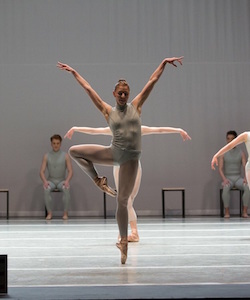
Pennsylvania Ballet Principal Lauren Fadeley in William Forsythe’s ‘The Second Detail’. Photo by Alexander Izililev.
Why College Dance?
Studying dance in college offers you four more years of honing your technique, taking classes in various styles, even rehearsing and performing quite regularly, depending on the program. In addition to just technique classes, however, you may also be exposed to other aspects of the art form: anatomy, music theory, dance history, composition, theatrical production, drama, improvisation, pedagogy and more.
“A university dance program provides the dancer with a holistic approach to their studies of the art of dance,” explains Chapman. “College dancers are given an opportunity to cross-connect information and experiences that extend beyond the typical studio training environment.”
Thus, dancers who obtain this vast skill set from a university setting are opened up to numerous potential job opportunities – not just performer, but also choreographer, educator, arts administrator, physical or movement therapist, dance critic, researcher and so on.
The college dance environment can be a safe learning environment, too, where professors get to know you over four years, and you learn and grow with the same group of dancers each day.
“There seems to be a lot more one-on-one attention in college,” Fadeley says, “as well as focusing on your growth and artistry as a dancer, to prepare you to become a professional. It also allows you performance opportunities that help build confidence in a welcoming and supportive setting.”
“You are with the same people every day, so a certain level of comfort comes into play,” adds Spring. “For me, personally, this allowed me to come out of my shell and start to transform as an artist. The level of support I received from my peers and professors was overwhelming.”
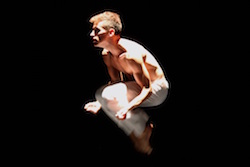
Parsons Dancer Ian Spring in David Parsons’ ‘Caught’. Photo by David Parsons.
Is it for Me?
As with any choice, studying college dance may have its pros and cons, so it’s best to weigh out both sides and decide if it’s the right path for you.
It does offer you four additional years of intensely studying your art, with the potential of growing as an artist and technician, and setting you up for a career in the field.
“I think it would be good for someone who still feels like they have more to learn about their body and dancing,” suggests Fadeley. “Life gives you these four years where it’s perfectly acceptable to not know what you want to do and gives you the time to discover and find out what makes you happy. When I was in NYCB, I was just too young and not ready to take on the professional world, and college gave me the time to figure it out.”
“Studying dance in college gains you exposure, experience, maturity and refinements,” Salgado adds. “It is a place to work on your craft. Additionally, I developed a sense of professional empowerment and creativity that has helped navigate my future as an artist and a professional adult.”
Salgado says that it was the instruction in dance and composition technique that she learned in a university setting that offered her the knowledge and confidence to start her own dance company.
Do you, too, want a career in the dance arts? And do you want to build up your skill set in other areas of the field to ensure a “back-up” or post-performance career plan? If so, college dance may be for you.
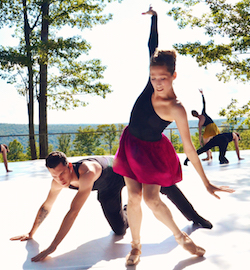
Donna Salgado performs with her company, CONTINUUM Contemporary/Ballet, at Jacob’s Pillow. Photo by Michael Darling.
“For those seeking longevity in their dance career, a college dance degree may prove to be an invaluable resource,” Chapman explains. “The broad studies required in a college dance program expands the young dancer’s capacity for seeking paid opportunities on stage, behind-the-scenes and in training facilities, and may provide the retiring performer with a more fluid transition.”
Studying dance in a university setting can be a great way to acquire connections within the field as well. Many schools have a top-notch faculty; some go above and beyond to offer master classes, residencies and guest choreographers. Both Spring and Fadeley say it was through the people they met in school that they were eventually able to line up jobs.
“One of my teachers, Jason McDole, had danced for [Parsons],” Spring explains. “In his class, we received quite a bit of Parsons’ style. This helped me immensely in the audition, and my connection to him was definitely a plus. The company knew who I was coming into the audition, which allowed me to be noticed immediately. Who knows if I would be here if it wasn’t for my training in college.”
Likewise, Fadeley says guest artists from Pennsylvania Ballet had set ballets at IU. Once she graduated, she took a corps de ballet spot with the company. Four years later, she was promoted to soloist, and the next year to principal.
These dancers prove that, even though after college you will be four years older, it doesn’t mean it’s too late to have a performance career.
“At the time, it felt so risky, and I felt so old,” Salgado admits, “but in actuality, I was finished with my second degree in my very early 20s, and as I became more involved in the New York City dance scene, I met many dancers who were far older than me performing and working in the art form.”
In addition, a college education is great for anyone who wants to “up” their smarts in general.
“Your required courses will make you smarter and understand politics and science better,” Salgado adds. “Your electives will awaken your interests and consequently make you more interesting. You will grant yourself the time to find yourself, and you will be grateful for that more than anything else. That alone will make you a better artist.”
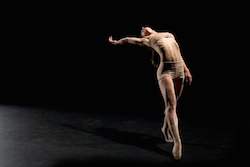
Tawny Chapman in Jennifer Backhaus’ ‘Incandescent’. Photo by Tim Agler.
Is it Not for Me?
If you are steadfast (and ready) to embark on your professional career immediately, then studying dance in college may not be for you.
“If you are ready to officially be out there in the world of dance and are confident that you don’t want to later do something else with your life, then use that time while you’re young to do it,” Fadeley advises.
Salgado adds, “If you know deep down inside that there is something else you would rather do, then you should follow that. Dancing is too difficult of a profession to not pursue it wholeheartedly.”
In addition, you have to be willing to go back to school for an additional four years.
“I remember thinking in high school, ‘I can’t wait to not have any more homework or tests,’” Fadeley recalls, “and in college it’s much more intensified.”
“The demands of a college dance program are rigorous,” adds Chapman. “The university dancer must be prepared to immerse themselves in long days filled with technique classes, general education and academic studies and rehearsals.”
College is a big time commitment, yes, but it may also be a financially heavy load.
“Financial pains are the biggest drawback of attending a university,” Spring comments. “Student loans are a burden in a field that does not pay as you think it should.”
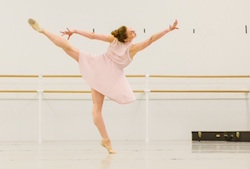
PA Ballet Principal Lauren Fadeley in rehearsal for Matthew Neenan’s ‘The Last Glass’. Photo courtesy of Fadeley.
Content with the Choice
These dancers all believe that their college dance experience set them up well for their professional performance careers, as well as gave them the knowledge and credentials for what may come next.
If you decide that studying dance in college is for you, then it will be in your best interest to make the most of the opportunity in order to reap the benefits.
“I think it is important to remember that college is only a part of the puzzle,” Salgado says. “I was a proactive dancer, attended networking events, summer intensives and workshops. College isn’t on-the-job training – it is an institution for higher learning – and your strongest asset as a professional and as an artist will be your mind. Your will, your networking, your creativity, your confidence and your perseverance will be what gets your talent(s) in the dance world and beyond.”
And mostly, be content with what you decide.
“Know that there is no right or wrong journey,” Salgado concludes. “Follow your gut, and do what is best for you. If there is anything that college gave me, it is the empowerment to think for myself, and I can only recommend the same for you!”
By Laura Di Orio of Dance Informa.
Photo (top): Freelance dancer Donna Salgado received both a BFA and MFA degree after high school. Photo by Laila Miroku.


